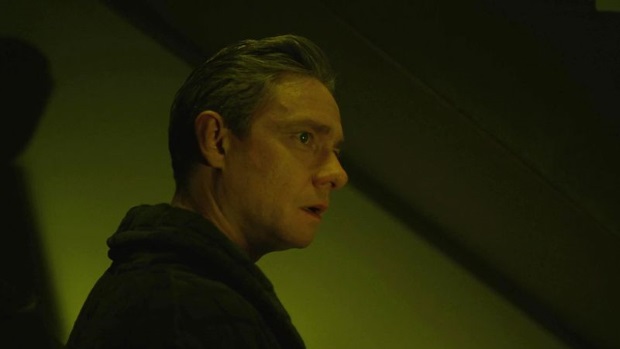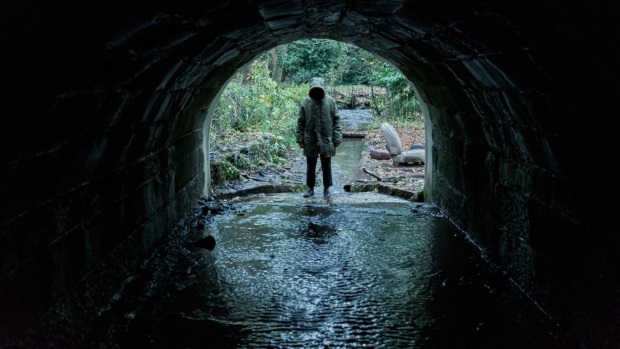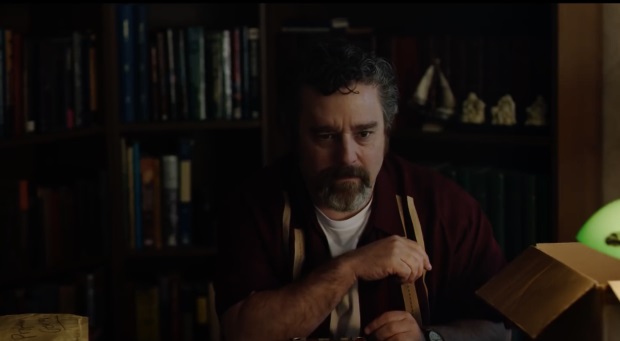Jeremy Dyson and Andy Nyman interview: Ghost Stories
We chat to the writer and director of the wonderful Ghost Stories, out in UK cinemas today...
At the start of interviews like this one you’ll often read about the interviewer arriving at a posh hotel and sitting down with the person they’re speaking to in a luxurious suite.
However, on a rainy Wednesday afternoon, rather than sleepwalking through Soho and slipping past a frowning doorman into the marble lobby of somewhere I could never to stay, I found myself trekking up a hill past Highgate Cemetery on my way to chat with the makers of Ghost Stories. The grey sky and a steady downpour were an inevitability; it would hardly do to talk about the film on a bright sunny day. I arrived at an ultra-modern house with an abundance of glass walls that overlooked the cemetery.
Ghost Stories is written and directed by Andy Nyman and Jeremy Dyson (Nyman also stars). Both are enthusiastic, whether giving thoughtful responses to questions or emitting bellowing laughs that rumble through the open building. Their film is an atmospheric spook show, at once reverent towards traditional British horror films while also full of invention. We sat sat down at a bench as rain dinked against a skylight overhead to talk about their experience making the film.
Here’s how we got on.
Congratulations on the film. It’s really good, I had a ton of fun with it. The first thing I always like to ask any horror filmmaker is, have you seen it with an audience yet and how was it?
Andy Nyman: We have. We’ve seen it with quite a few audiences now. Firstly, after our test screenings, we saw it at the London Film Festival, that was the acid test really, and then we’ve seen it at South by Southwest, and then last night. It’s so exciting seeing it with an audience, because you hear laughs and screams and you see jumps, and then you also hear those brilliant silences of just dread, almost.
Jeremy Dyson: And it was great as well, actually, seeing how remarkably similarly it played at South by Southwest to here, with an American audience. Particularly those second and third screenings where it was punters with no agenda. That was really exciting for us.
So Ghost Stories is adapted from a play. What were the considerations you had to make when adapting it for the screen?
JD: Well I think the biggest challenge was, when we’d originally created the play part of the fun was taking almost clichés of horror films and putting them on stage, which you hadn’t seen before and that was exciting in itself. Going the other way, the risk is you just end up with a load of clichés. So that was challenge number one, how do we make this fresh and exciting and working as a film in its own right, rather than just another cliché? So a lot of thought went into that.
AN: Yeah. And also, because, I know it sounds obvious, but they’re vastly different mediums, going from stage to screen and how you can connect with an audience. It’s so different. So, it was a really difficult and exciting process, finding new ways, getting rid of some of the old ways that we’d been relying on that work in the theatre and having to let them go, and then finding new things and new games to play. New twists and turns to put in there that would keep it feeling fresh and exciting for an audience.

One of the things I really like about it is, I know the title is Ghost Stories, but it has a feeling of gleeful storytelling to it, and then there’s the levity in it. How difficult is it to retain that sense of gleefully telling a story while going through the technical rigmarole of making a film?
AN: How do we retain the sense of fun, do you mean?
Yeah, when you’re grinding. Because making a film is a long process.
AN: It is, but…
JD: …there wasn’t a day when we weren’t having fun, is the honest truth of it.
AN: Because look, you’re Den of Geek. Like us, you are geeks. There’s nothing cynical about the joy of someone going ‘Here’s some money, make your film’. And you just think ‘Fuck, what a gift!’ And literally, we are pinching ourselves. I mean, the idea that we’re coming to do a junket for our horror film and sign our posters!
JD: We met when we were 15 and have been best friends ever since, and one of the things we bonded over from the first day we met was this. So there’s a big part of us, probably 98%, that is still that 15-year-old fanboy. So that is present every day that we worked on it.
AN: I do think as well, and I don’t mean this in any back-patty way at all, but I do think our love and excitement of it means that you end up choosing heads of departments that are kindred spirits. So, our designer Grant Montgomery, a more obsessive, enthusiastic human being you could not wish to meet.
JD: And the same with our composer (Haim Frank Ilfman) and our director of photography (Ole Bratt Birkeland), they were all the same.
AN: I’m sure that those personality types aren’t for everyone, but for us it was just heaven. Because you’re playing with people who feel the same way. It’s never, you turn up and it’s a job. ‘Come on guys, we’ve got a lot to do today!’ It was never that. It was always like ‘Oh my god, look at everything we’ve got to do today, how amazing!’ Of course there are challenges, and there are moments where you think ‘Fuck me.’
JD: And everybody had their inner child close to the set. So even our wonderful physical effects guy, Ian Rowley, who’s 70 and has been in the business literally since the 1950s, he was that. Every time he came up with something to show us, he was so excited.
(Laughter)
AN: He was brilliant. It’s so true.
JD: Even after the film when he was ringing you. (adopts voice) “I did an acid attack today. Oldest trick in the book. Bicarbonate soda, citric acid.”
(More laughter)
AN: It is fantastic. So, it never felt like that the. The joy of it, right the way through the edit. Of course there are gonna be days when you’re in the middle of it where…
JD: …there are challenges.
AN: There are challenges, and it’d be nice to see daylight, but, you know, it’s heaven.

The British horror scene is really interesting. There’s quite a vibrant scene, if you go to Frightfest and to screenings. But it doesn’t feel like there are a lot of high profile, theatrically released British horror films. Was it a difficult process to get yours made?
AN: Well, I think that’s a really interesting question actually. Not so much about our release, but about the UK horror market. Because there are some really good emerging films and some really good emerging filmmakers, and you see stuff that goes out at Frightfest that never then gets to see the light of day. It is difficult. One of the things that I sometimes think is difficult is, there tends to be, and this isn’t a criticism of anything, but there tends to be a bit of small thinking a lot of the time about where you want your film to be seen. And very often, I think, because it’s often easier to make a low budget film you just dig in and do it. Sometimes I think they can be a bit small.
We were blessed because Ghost Stories the play was already a product.
JD: Well that was the thing, because we had an unusual trajectory. I find it fascinating, this all began for me nearly 10 years ago with a phone call out of the blue from Andy saying he’d had an idea for a play. He could easily have rung me out of the blue and said I’ve had an idea for a film and I think if that had been the case our journey would have been very different.
AN: I agree, yeah.
JD: It wasn’t like we knew what was gonna happen when we put the play on, because the play was only supposed to be for 6 weeks. But something about going through the backdoor in that way enabled us to get to this place where, let’s be honest, we’re first time movie directors, and yet we’ve done it where we’ve ended up like this, which wasn’t part of any game plan. But I think it was because of the play because that meant when were going out there with the film script it was already a proven concept, in a way.
AN: I think that’s, definitely, 90% of that. But there’s another key part and something that we talk about a lot at the moment because we develop what our next thing is. There’s a huge advantage to it being a play, which is that we had lived with that script, and honed that story in that script…
JD: …with an audience…
AN: …for seven years. Well, most scripts don’t get that breathing period or that testing ground. So it meant that we, even though we had to take that script and that story and in some respects tear it up and start again, it meant that there was a sort of bedrock there that had been so audience tested. And that’s a really interesting way round it.
JD: Again, none of it was part of some grand master plan, it just happened that way. You look back and go well it’s interesting that it happened that way, because it’s led us to this.

AN: Another thing, aside from ours, I saw a few films recently that, it bothers me that they don’t get out there a bit more. Good British genre films. The Ritual was really interesting and Double Date I thought was really terrific.
JD: But let’s not undersell the scene, because also you have Ben Wheatley who’s been out there doing amazing work.
AN: Yes, of course.
JD: Creative and on tiny budgets initially, and yet really getting noticed internationally.
(Someone has popped their head in the door)
I guess that’s my minute. So, we ask everyone their favourite Jason Statham movie.
AN: (noticeably excited) Ah, that is a good question.
I’m very pleased. Some people look at me very strangely when I ask it.
AN: They’re idiots. I love a bit of Statham.
JD: Andy, can you answer on my behalf?
AN: I will answer on your behalf. On Jeremy’s behalf I am gonna say Crank, because of the sheer energy of the film and Jeremy has that raw, mad energy.
I truly do love a Statham film. I really loved The Mechanic, and particularly that fight scene in the middle is extraordinary. But, I think old school wise, it would have to be Snatch. I watched it again recently and I just think it’s so good, such a tremendous film.
I think he’s a proper star, Statham. But again, it’s great commercial product, and it’s interesting that you ask that because in Britain, that’s one of the diseases here. People are so fucking sniffy about commercial cinema.
JD: It’s insane, when you consider our history of commercial cinema, something happened circa 1980 where we had a collective nervous breakdown in the film industry and lost our bottle.
AN: And that’s what I love about it. I think his films deliver. It’s what you want to go and see, and I think that’s what you get.
Jeremy Dyson and Andy Nyman, thank you very much!
Ghost Stories is in UK cinemas from Friday.